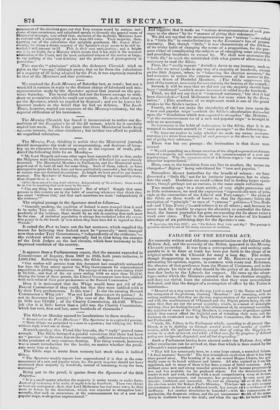The Globe on Monday opened its lucubrations in these words-
" Grand enure du P. re Duchesne ! The Spectator is in a splendi.1 passion. " Many things are permitted to a man in a passion ; but vilifying the Globe without reply is not one of them."
Notwithstanding this Pistol-like bravado, the " reply" proved tame enough. The Globe betrayed a painful conviction that there had been no " passion " in the case, but on the contrury, sufficient coolness to teach it the prudence of very cautious fencing. The thing wanted, however, was a smart introduction for the leader, no matter whether the predi- cate were true or false.
The Globe says it wrote from memory last week when it indited -this- " The Spectator weekly repeats how unprecedented it is that at the com- mencement of a new and popular reign, &c. the party in power should not have reinforced their majority by hundreds, instead of remaining, to say the best, stationary."
Being put to the proof, it quotes from the Spectator of the 26th
August- " It is a small matter whether the majority is under twenty or under forty. Instead of reeleoning it by units, it ought to be by hundreds. These two things at least are undisputed—first, that Lord Melbourne has lost sonic votes, be they more or fewer, by the dissolution, which was expected to strengthen him: secondly, that such an occurrence, at the commencement too of a new and popular reign, is altogether unprecedented." nests that it made no "serious misrepresentation of suchpas. sages as the above " by its " manner of giving their substance."
We did not say that the misrepresentation was " serious "—we called it a "little fib," in contradistinction to the Examiner's lies of greater enormity. But, though "little," it was characteristic of the Globe_ ofits tricky habit of changing the terms of a proposition, for the pur. pose either of complicating the subject or of smuggling some advantage and providing loopholes to escape by. We shall now anatomize the " little fib," to teach the uninitiated with what grains of allowance it is necessary to read the Globe.
First, the " wee/dg repeats " dmindlee down to one instance, such as it is—for we never spoke in any way of a majority of hundreds, except on the 26th August, when, in " balancing the election accounts," we bad occasion to notice the extreme minuteness of the matter in dis- pute—a dozen of Doubtful Members. ( The Globe suppresses this part of the context, necessary for ascertaining the bearing of the remark.) Second, it will be seen that we did not se>, the majority should have been "reinforced "—which means increased or added to—by hundreds. Third, we did not say that it "retrained stationary," but that it had been diminished—" Lord Melbourne has lost some votes by the disso- lution." ( This avoidance of an unpleasant truth is one of the grand strokes in the Globe's tactics.)
Fourth, we did not make the singularity of the loss turn upon the " new and popular reign "—which the Globe's adumbration does—but upon the "dissolution which was expected to strengthen" the Minister ; "at the commencement too of a new and popular reign" is brought in only as an accessory. So inveterate is the habit of indirectness in the Globe, that it is at. tempted to insinuate untruth its " such passaged" as the following-
" We leave our readers to judge whether we made any serious misrepre- sentation (we wrote from memory) of such passages as the above by our man. ner of giving their substance."
There was but one passage : the insinuation is that there were several.
" We said something on a former occasion of the alleged unprecedentedoccur- rence of a majority not overwhelming, at the commencement of a new and popular reign. Why the commencement of allethrm reign is ' an occurrence altogether unprecedented.' "
Here, even in the transition from one line to another, the terms are changed—" Reform" being substituted for "new and popular. "
Naturalists dissect butterflies for the benefit of science : we have dissected a "little fib," not for its intrinsic importance, but to eluci. date the craft. Doubtless we could seldom fail in finding larger speci. mess, though perhaps not so curious, in the same ample collection.
Two months ago,* in a short article, of very slight pretension and as little seriousness, we used the expression "impracticable men of prin. tilde at the extremities of the Liberal and Tory camps : " the gloss of the Globe on these words of banter is, that the Spectator limits the ascription of " principle" to men of "extreme" politics—Ultra-Radi- cal; and Ultra. Tories (!)—and refuses it to all others ; and, because we never took the trouble to expose the absurdity or contradict the false- hood, the honest journalist has gone on repeating the lie about twice a week ever since. That is the moderate use he makes of his boasted advantage of six publishing-days for the Spectator's one.
• Spectator. 81111nly 1537 ; art. " Sir Robert Peel sick and sly." The passage in question alluded to one of the many rumours of coalition,


























 Previous page
Previous page